book3U1 grammar3[上学期]
文档属性
| 名称 | book3U1 grammar3[上学期] |
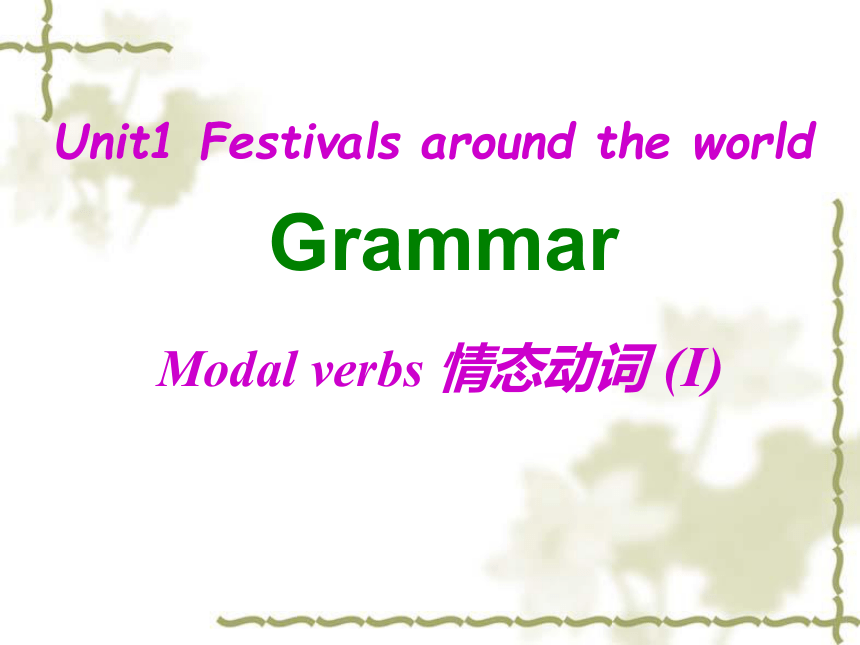
|
|
| 格式 | rar | ||
| 文件大小 | 67.0KB | ||
| 资源类型 | 教案 | ||
| 版本资源 | 通用版 | ||
| 科目 | 英语 | ||
| 更新时间 | 2007-03-03 00:00:00 | ||
图片预览


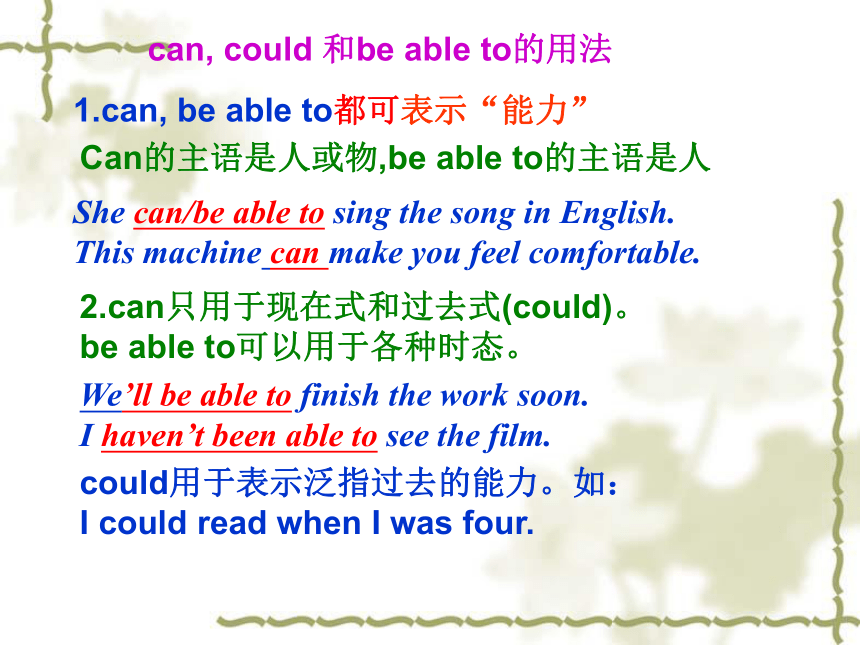
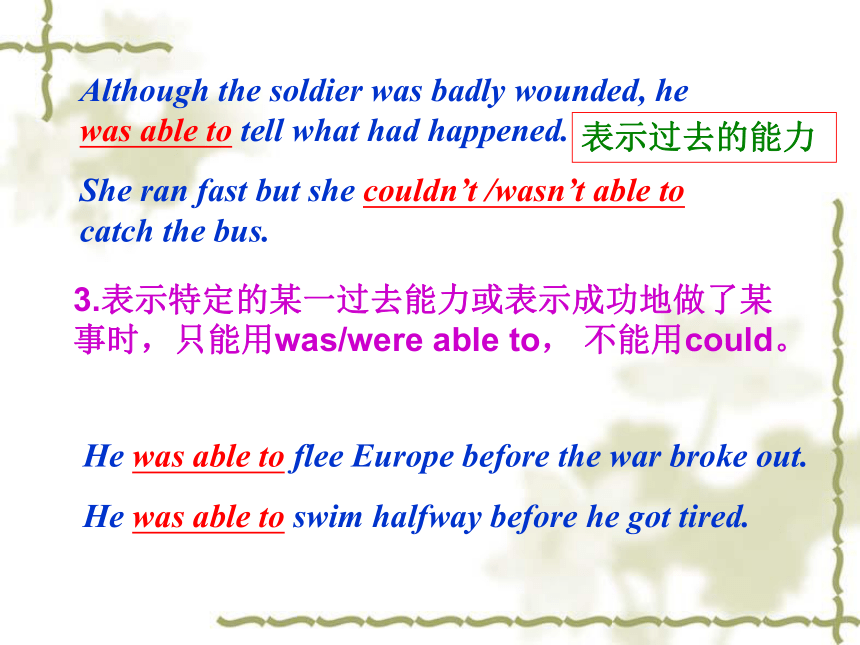
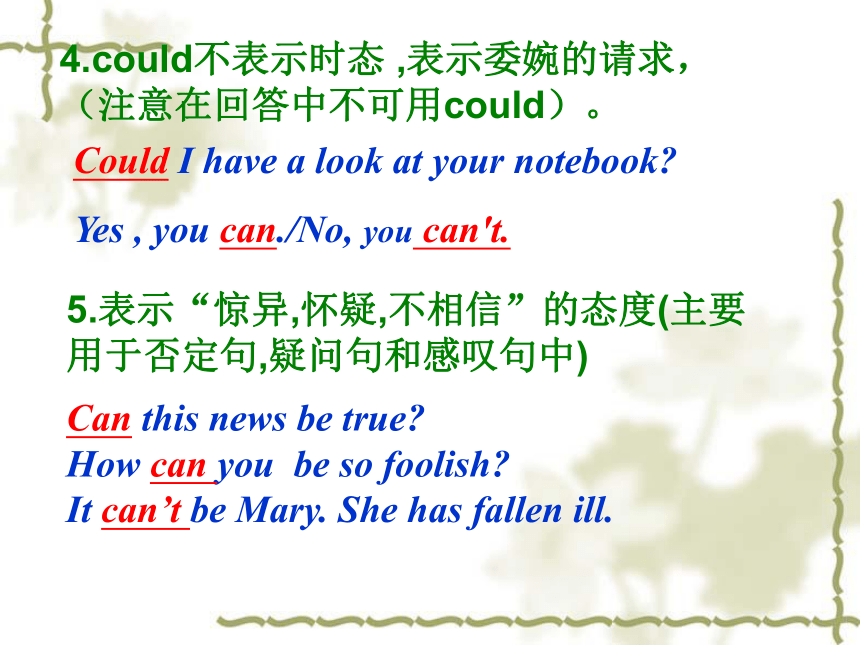
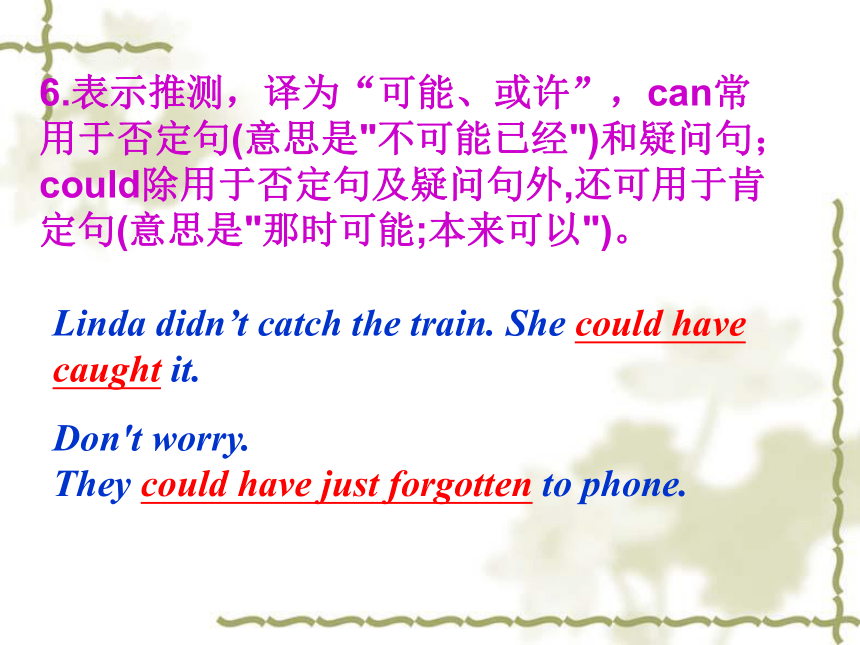
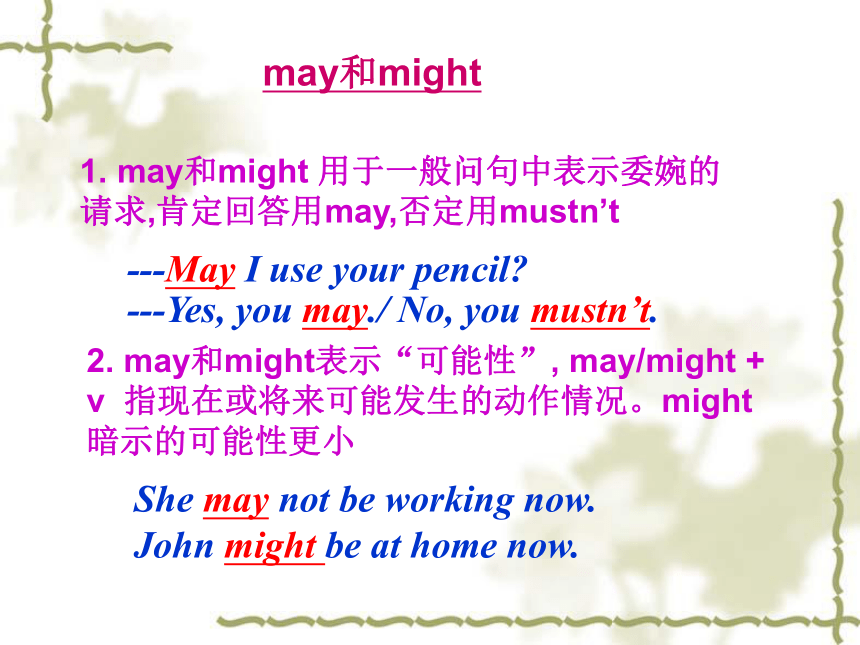
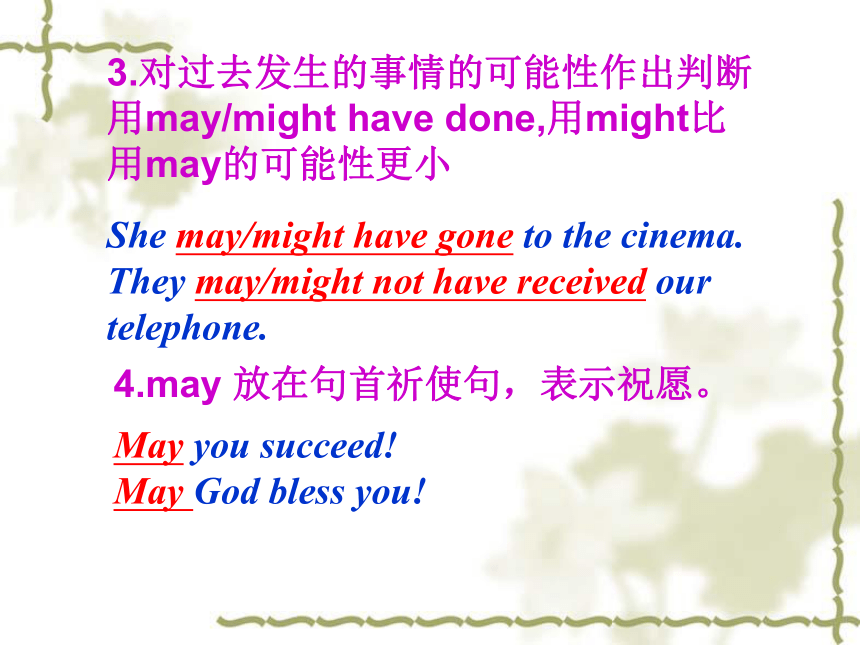

文档简介
课件20张PPT。GrammarModal verbs 情态动词 (I)Unit1 Festivals around the world·情态动词的语法特征1)?情态动词?不能单独做谓语,除ought ?和have?外,后面只能接不带to?的不定式。 2)?情态动词没有人称,数的变化,但有些情态动词,如can、will也有一般式和过去式的变化。3)?情态动词的“时态”形式并不是时间区别的主要标志,不少情况下,情态动词的现在式形式和过去式形式都可用来表示现在时间、过去时间和将来时间。can, could 和be able to的用法She can/be able to sing the song in English.
This machine can make you feel comfortable.1.can, be able to都可表示“能力”Can的主语是人或物,be able to的主语是人 We’ll be able to finish the work soon.
I haven’t been able to see the film.2.can只用于现在式和过去式(could)。be?able?to可以用于各种时态。 could用于表示泛指过去的能力。如: I?could?read?when?I?was?four. Although the soldier was badly wounded, he was able to tell what had happened.
She ran fast but she couldn’t /wasn’t able to catch the bus.3.表示特定的某一过去能力或表示成功地做了某事时,只能用was/were?able?to,?不能用could。 He?was?able?to?flee?Europe?before?the?war?broke?out. ??
He?was?able?to?swim?halfway?before?he?got?tired. 表示过去的能力Could I have a look at your notebook?
Yes , you can./No,?you?can't. 4.could不表示时态 ,表示委婉的请求,(注意在回答中不可用could)。 Can this news be true?
How can you be so foolish?
It can’t be Mary. She has fallen ill.5.表示“惊异,怀疑,不相信”的态度(主要用于否定句,疑问句和感叹句中)Linda didn’t catch the train. She could have caught it.
Don't?worry. They?could?have?just?forgotten?to?phone. 6.表示推测,译为“可能、或许”,can常用于否定句(意思是"不可能已经")和疑问句;could除用于否定句及疑问句外,还可用于肯定句(意思是"那时可能;本来可以")。 may和might ---May I use your pencil?---Yes, you may./ No, you mustn’t.1. may和might 用于一般问句中表示委婉的请求,肯定回答用may,否定用mustn’tShe may not be working now. John might be at home now.2. may和might表示“可能性”, may/might + v 指现在或将来可能发生的动作情况。might暗示的可能性更小 She may/might have gone to the cinema. They may/might not have received our telephone.3.对过去发生的事情的可能性作出判断用may/might have done,用might比用may的可能性更小 May you succeed! May?God?bless?you! 4.may?放在句首祈使句,表示祝愿。 Will 和 wouldIf you will help me with my English, I will be very happy.
I promised that I would do my best.1.will和would表示意愿、意志,可用于各种人称Will you tell him the news as soon as he comes back?
Would you please speak again more slowly?2.在疑问句中,will用于第二人称,表示请求或征求意见,would则语气更委婉shall ,should 和ought toYou shall do as I say. (命令)
Tell him that he shall have the book tomorrow. (允诺)
Nothing shall stop me doing it. (决心) 1.shall用于第二、三人称表示允诺、警告、命令、决心等。Shall I open the window for you?(征求意见)
Shall he fetch some water for you?(请求)2.在疑问句中,用于第一、三人称,用来表示请求或征求意见。Young people should learn how to use computers. Every citizen ought to obey law. You ought not to go.3. should常表示劝告、建议、命令,与ought to意义相近,但ought to多表示责任、义务,语气强烈。在疑问句中通常用should代替ought to。You should/ought to have told her the truth earlier.
She shouldn’t have left without saying a word.4.should/ought to have done表示责备或批评,意为“本应该做到…但没有做到…”,用于否定则表示“本不该…但”ought to的语气更强烈.must 和have?to1.Must用于一般问句中,肯定回答用must否定式用?needn’t或don’t have to,做?“不必”,mustn’t表示“禁止,不允许” ?— Must?I?finish?all?assignments?at?a?time? ??—Yes, you must.
No,?you?needn't. You?mustn’t?get?down?while?the?car?is?still? moving. I don’t like this TV set. We must buy a new one. There was no more bus. They had to walk home.2.表示“必须”这个意思时,must?和have?to?稍有区别。must着重说明主观看法,have?to?强调客观需要。另外,have?to?能用于更多时态。 ?You?must?be?the?new?teacher. ?
He?must?be?joking. There?is?nobody?here.?They?must?have?all gone?home. 3.must表示对某人某事的猜测,?作“准是”,“一定” ,一般用于肯定句中。对过去发生的事情作肯定判断用must have done He must come and worry her with question, just when she was busy cooking the dinner. Of course,after I gave her my advice,she must go and do the opposite。4. Must表示“偏要,硬要”,指做令人不快的事情1.---There were already five people in the car but they managed to take me as well.
---It ____a comfortable journey. ( )
A. can't be B. mustn't have been
C. shouldn't be D. couldn't have been
D2.The fire spread through the hotel very quickly but everyone ___ get out. ( )
A. had to B. would
C. could D. was able to
DEXERCISES4. Peter ___ come with us tonight, but he isn’t very sure.
must B. can C. may D. willC5. --- Could I call you by your first name? --- Yes, you____.
A. will B. could C. may D. mightC6. Sorry, I ’m late. I ___ have turned off the alarm clock and gone back to sleep again.
might B. should C. can D. willA7.--Excuse me, but I want to use your computer to type a report.
--You ____ have my computer if you don’t take care of it.
A. shan’t B. might not C. needn’t D. shouldn’tA8. ---When can I come for the photos ? I need them tomorrow afternoon.
---They _____be ready by 12 : 00 .
A. can B. should C. might D. needB9. With so much work on hand, you ____to see the game last night.
A. mustn’t go B. could have gone
C. shouldn’t go D. shouldn’t have goneD10.Johnny, you ______play with the knife, you ____hurt yourself. ( )
A. won't ; can't B. mustn't ; may
C. shouldn't ; must D. can't ; wouldn'tB11.There is no light in the dormitory. They must have gone to the lecture, _____? ( )
A. didn’t they B. don’t they
C. mustn’t they D. haven’t theyD12. I missed the bus, so I ___ go home on foot.
A. must B. may C. can D. had toDThank you
This machine can make you feel comfortable.1.can, be able to都可表示“能力”Can的主语是人或物,be able to的主语是人 We’ll be able to finish the work soon.
I haven’t been able to see the film.2.can只用于现在式和过去式(could)。be?able?to可以用于各种时态。 could用于表示泛指过去的能力。如: I?could?read?when?I?was?four. Although the soldier was badly wounded, he was able to tell what had happened.
She ran fast but she couldn’t /wasn’t able to catch the bus.3.表示特定的某一过去能力或表示成功地做了某事时,只能用was/were?able?to,?不能用could。 He?was?able?to?flee?Europe?before?the?war?broke?out. ??
He?was?able?to?swim?halfway?before?he?got?tired. 表示过去的能力Could I have a look at your notebook?
Yes , you can./No,?you?can't. 4.could不表示时态 ,表示委婉的请求,(注意在回答中不可用could)。 Can this news be true?
How can you be so foolish?
It can’t be Mary. She has fallen ill.5.表示“惊异,怀疑,不相信”的态度(主要用于否定句,疑问句和感叹句中)Linda didn’t catch the train. She could have caught it.
Don't?worry. They?could?have?just?forgotten?to?phone. 6.表示推测,译为“可能、或许”,can常用于否定句(意思是"不可能已经")和疑问句;could除用于否定句及疑问句外,还可用于肯定句(意思是"那时可能;本来可以")。 may和might ---May I use your pencil?---Yes, you may./ No, you mustn’t.1. may和might 用于一般问句中表示委婉的请求,肯定回答用may,否定用mustn’tShe may not be working now. John might be at home now.2. may和might表示“可能性”, may/might + v 指现在或将来可能发生的动作情况。might暗示的可能性更小 She may/might have gone to the cinema. They may/might not have received our telephone.3.对过去发生的事情的可能性作出判断用may/might have done,用might比用may的可能性更小 May you succeed! May?God?bless?you! 4.may?放在句首祈使句,表示祝愿。 Will 和 wouldIf you will help me with my English, I will be very happy.
I promised that I would do my best.1.will和would表示意愿、意志,可用于各种人称Will you tell him the news as soon as he comes back?
Would you please speak again more slowly?2.在疑问句中,will用于第二人称,表示请求或征求意见,would则语气更委婉shall ,should 和ought toYou shall do as I say. (命令)
Tell him that he shall have the book tomorrow. (允诺)
Nothing shall stop me doing it. (决心) 1.shall用于第二、三人称表示允诺、警告、命令、决心等。Shall I open the window for you?(征求意见)
Shall he fetch some water for you?(请求)2.在疑问句中,用于第一、三人称,用来表示请求或征求意见。Young people should learn how to use computers. Every citizen ought to obey law. You ought not to go.3. should常表示劝告、建议、命令,与ought to意义相近,但ought to多表示责任、义务,语气强烈。在疑问句中通常用should代替ought to。You should/ought to have told her the truth earlier.
She shouldn’t have left without saying a word.4.should/ought to have done表示责备或批评,意为“本应该做到…但没有做到…”,用于否定则表示“本不该…但”ought to的语气更强烈.must 和have?to1.Must用于一般问句中,肯定回答用must否定式用?needn’t或don’t have to,做?“不必”,mustn’t表示“禁止,不允许” ?— Must?I?finish?all?assignments?at?a?time? ??—Yes, you must.
No,?you?needn't. You?mustn’t?get?down?while?the?car?is?still? moving. I don’t like this TV set. We must buy a new one. There was no more bus. They had to walk home.2.表示“必须”这个意思时,must?和have?to?稍有区别。must着重说明主观看法,have?to?强调客观需要。另外,have?to?能用于更多时态。 ?You?must?be?the?new?teacher. ?
He?must?be?joking. There?is?nobody?here.?They?must?have?all gone?home. 3.must表示对某人某事的猜测,?作“准是”,“一定” ,一般用于肯定句中。对过去发生的事情作肯定判断用must have done He must come and worry her with question, just when she was busy cooking the dinner. Of course,after I gave her my advice,she must go and do the opposite。4. Must表示“偏要,硬要”,指做令人不快的事情1.---There were already five people in the car but they managed to take me as well.
---It ____a comfortable journey. ( )
A. can't be B. mustn't have been
C. shouldn't be D. couldn't have been
D2.The fire spread through the hotel very quickly but everyone ___ get out. ( )
A. had to B. would
C. could D. was able to
DEXERCISES4. Peter ___ come with us tonight, but he isn’t very sure.
must B. can C. may D. willC5. --- Could I call you by your first name? --- Yes, you____.
A. will B. could C. may D. mightC6. Sorry, I ’m late. I ___ have turned off the alarm clock and gone back to sleep again.
might B. should C. can D. willA7.--Excuse me, but I want to use your computer to type a report.
--You ____ have my computer if you don’t take care of it.
A. shan’t B. might not C. needn’t D. shouldn’tA8. ---When can I come for the photos ? I need them tomorrow afternoon.
---They _____be ready by 12 : 00 .
A. can B. should C. might D. needB9. With so much work on hand, you ____to see the game last night.
A. mustn’t go B. could have gone
C. shouldn’t go D. shouldn’t have goneD10.Johnny, you ______play with the knife, you ____hurt yourself. ( )
A. won't ; can't B. mustn't ; may
C. shouldn't ; must D. can't ; wouldn'tB11.There is no light in the dormitory. They must have gone to the lecture, _____? ( )
A. didn’t they B. don’t they
C. mustn’t they D. haven’t theyD12. I missed the bus, so I ___ go home on foot.
A. must B. may C. can D. had toDThank you
